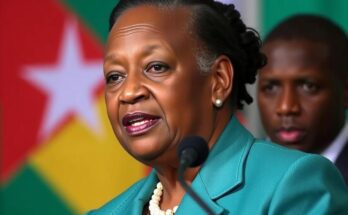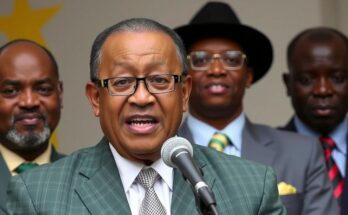South Africa has closed its border with Mozambique due to escalating post-election violence. Protests have led to significant casualties, with at least 20 reported dead amid clashes between police and demonstrators. Opposition groups contest the results of the October 9 elections, alleging electoral fraud by the ruling Frelimo party. Concerns over safety have prompted the South African government to advise against non-essential travel to Mozambique.
South Africa has recently taken the decisive step of closing its border with Mozambique due to the escalating violence that has followed the recent elections in the neighboring country. Initially, the border was reopened earlier in the week, but this decision was promptly retracted as unrest intensified, with violent clashes occurring between police and demonstrators protesting the election results. The South African government has advised its citizens to avoid any non-essential travel to Mozambique at this time. Reports from Amnesty International indicate that the protests, which began in late October, have resulted in at least 20 fatalities, alongside many injuries and arrests. These disturbances stem from opposition groups contesting the outcome of the October 9 elections, which saw the ruling Frelimo party extend its nearly five-decade rule. Protesters have faced violent responses from authorities, including the use of teargas in the capital, Maputo. Opposition leader Venancio Mondlane, who garnered 20% of the vote in the presidential elections, has reportedly fled Mozambique following the murder of two aides prior to the announcement of results. In light of the violence, the South African Border Management Agency stated that they shut the border following an influx of 15 Mozambican border employees seeking safety. Commissioner Mike Masiapato described the situation as dire, highlighting serious instances of looting and disorder within Mozambique. Minister of International Relations Ronald Lamola expressed South Africa’s concern over the violence, stating, “South Africa expresses concern at the outbreak of incidents of post-electoral violence and regrets the loss of lives and destruction of property.” Furthermore, Mozambique has experienced disruptions to its internet services since last week. The ruling Frelimo party is accused of electoral manipulation favoring their candidate, Daniel Chapo, who received over 70% of the votes according to the Mozambique Electoral Commission. While the Commission declared these results, it is the responsibility of the Constitutional Council to validate them and address any disputes raised by opposition parties, including Renamo and Podemos. The government has since threatened to deploy military forces to counter the protests, labeling them as attempts to undermine a democratically elected government. Human rights organizations have condemned the government’s response, characterizing it as the most severe crackdown witnessed in recent years.
The recent closure of the South African border with Mozambique is indicative of the rising tensions and violence that have erupted following controversial elections in Mozambique. As the Frelimo party continues its long-standing regime, opposition groups have organized protests contesting the election results, which they allege were marred by rigging. The response from authorities has led to a series of violent clashes with demonstrators, prompting bordering nations to take precautionary measures to ensure the safety of their citizens and maintain order.
In conclusion, the closing of the South African border with Mozambique reflects the severity of the post-election unrest in Mozambique, highlighted by violence, protests, and significant casualties. The response from both governments indicates a growing concern over civil stability, as South Africa seeks to protect its citizens amid rising tensions. The international community is urged to monitor the situation closely as human rights organizations condemn the government’s crackdown on dissenting voices.
Original Source: guernseypress.com




